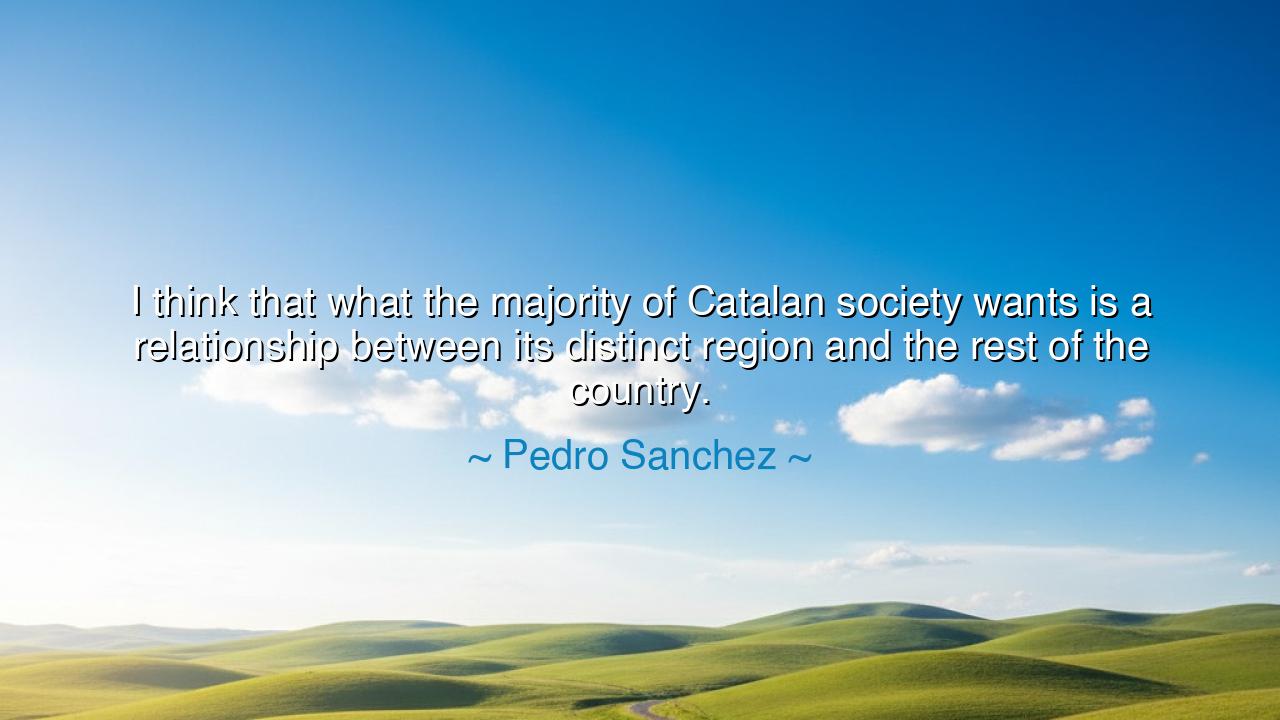
I think that what the majority of Catalan society wants is a
I think that what the majority of Catalan society wants is a relationship between its distinct region and the rest of the country.






Hear now the words of Pedro Sánchez, spoken in the midst of a land divided, yet yearning for unity: “I think that what the majority of Catalan society wants is a relationship between its distinct region and the rest of the country.” These words are born not of abstract philosophy, but of struggle and tension, of centuries in which Catalonia has wrestled with its identity and its place within Spain. In them lies a truth as old as nations themselves: that people long for belonging, but also for recognition of their uniqueness.
For Catalonia has long been a land of proud culture and fierce independence, with its own language, traditions, and memory of sovereignty. At times it has flourished in harmony with Spain; at other times, conflict has erupted, with cries for secession rising like storm winds. Yet Sánchez, as a leader, recognized the yearning of the majority—not for total separation, nor for blind submission, but for a relationship that honors both unity and distinction. This is the ancient challenge of all federations and kingdoms: how to hold together what is diverse without crushing its spirit.
History is rich with tales of this balance. Consider the ancient Greek city-states. Each was distinct—Athens with her love of learning, Sparta with her devotion to arms, Corinth with her commerce. Yet, when the Persian threat loomed, they joined together in a fragile relationship, preserving their freedom without erasing their differences. Unity did not mean uniformity; rather, it was a bond forged for survival and mutual respect. In the same way, Sánchez’s words remind us that Catalan society does not seek the erasure of Spain, but a bond that preserves dignity and honors identity.
But look also to the tragedies when such balance was denied. The Austro-Hungarian Empire, a mosaic of languages and peoples, failed to grant fair voice to its distinct regions. Instead of fostering respectful relationships, it imposed the dominance of some over others. The result was resentment, rebellion, and ultimately collapse. Thus, Sánchez’s recognition carries wisdom: if the country is to endure, it must not demand silence from its regions, but cultivate a living dialogue that allows both the part and the whole to thrive.
The meaning of this reflection is thus clear: a society cannot be held together by force alone, nor by the dream of uniformity. It must be built on relationships—relationships of respect, recognition, and cooperation. A nation is strongest not when all are the same, but when its differences are embraced as sources of richness, when the voice of each region is heard and woven into the greater harmony.
So what lesson must we carry into our own lives? That unity is not the destruction of difference, but the celebration of it. In families, in communities, in nations, there will always be distinct parts—each with its history, its character, its pride. To deny them is to sow resentment; to honor them is to build trust. We must, like wise gardeners, cultivate bonds that do not strangle but nourish, allowing each branch to grow strong while feeding from the same root.
Therefore, O listeners, remember the wisdom in Sánchez’s words. The future of society lies not in conquest or suppression, but in the art of building relationships that endure. Let us labor to see the dignity in each people, each community, each voice, and in doing so, we preserve not only the parts, but the whole. For a country that knows how to honor its diversity shall endure, while one that denies it will surely fracture and fade.
Thus, take this teaching as your own: seek always the balance between unity and freedom, between belonging and distinction. In this lies the path to peace, not only for Catalonia and Spain, but for all nations, and indeed for all of humankind.






AAdministratorAdministrator
Welcome, honored guests. Please leave a comment, we will respond soon